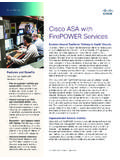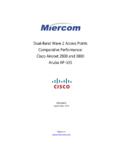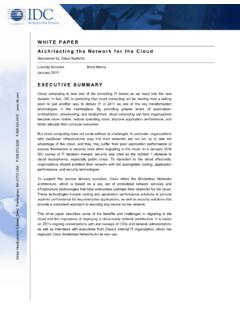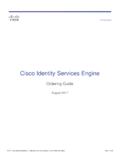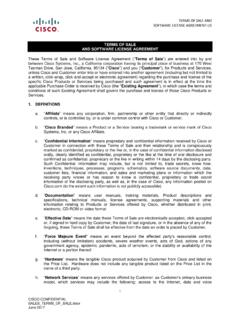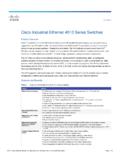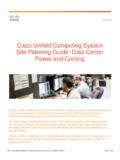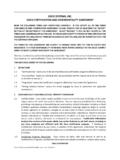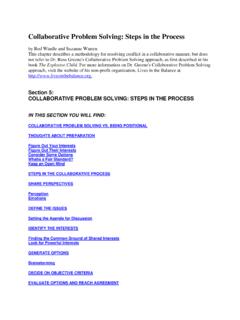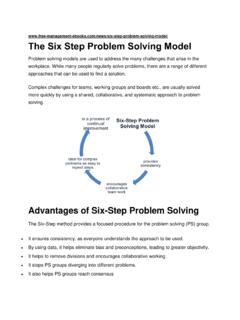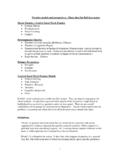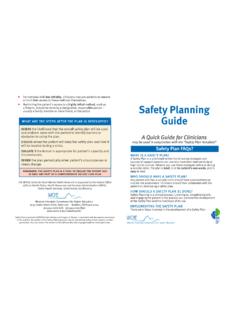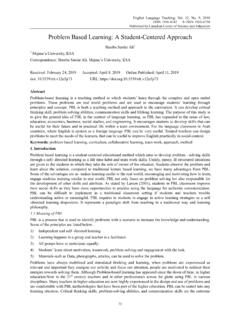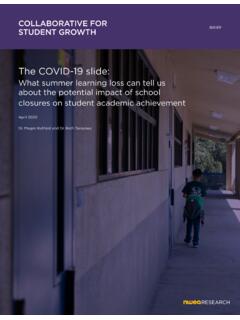Transcription of ASSESSMENT & TEACHING of 21st CENTURY SKILLS
1 ASSESSMENT & TEACHING . of 21st CENTURY SKILLS . Status Report as of January 2010. How we live, work, play and learn has been dramatically transformed by technology over the past 20 years. We need different SKILLS today than we did in the 20th CENTURY , and educational institutions have a critical role to play in developing those SKILLS . But by and large, primary and secondary schools have not kept pace with the changing skill sets that students need to succeed. In fact, there's nothing broad-based in place right now to determine whether our schools are doing well at TEACHING these SKILLS . Governments as well as schools need to know what works and what doesn't.
2 Cisco Systems Inc., Intel Corporation and Microsoft Corp. unveiled plans in January 2008 to sponsor a project to research and develop new approaches, methods and technologies for measuring the success of 21st- CENTURY TEACHING and learning in classrooms around the world. The ASSESSMENT and TEACHING of 21st CENTURY SKILLS (ATC21S) project is focused on defining those SKILLS and developing ways to measure them. School officials and global ASSESSMENT organizations such as the Organisation for Economic Cooperation and Development (OECD) and the International Association for the Evaluation of Educational Achievement (IEA) will be able to use these methods of ASSESSMENT to evaluate how well schools are TEACHING 21st- CENTURY SKILLS .
3 ASSESSMENT plays a critical role in setting standards and influencing curricula at the local, regional, national and global level, so it is expected that these new assessments will motivate schools to do more to instill 21st- CENTURY SKILLS . In announcing the project, the three companies stated, What is learned, how it is taught and how schools are organized must be transformed to respond to the social and economic needs of students and society as we face the challenges of the 21st CENTURY .. 2009 Progress Highlights: Signed five countries to participate in pilot projects Enlisted more than 60 global education experts to lead the research phase of the effort Completed key research to move the project from a theoretical phase into a practical phase Defined a frame- Zeroed in on the Began identifying Determined that Extended the work for 21st- key questions to new types of group typical ASSESSMENT CENTURY SKILLS and which the information that performance period to include selected three project should can be gathered needs to be both primary and categories to focus seek answers with computer- assessed in secondary schools on immediately based student
4 Addition to so that develop- assessments individual mental factors for student 21st- CENTURY SKILLS performance can be studied Five founder countries have agreed to take part in the research and will deploy ATC21S pilot projects in schools as early as February. The five are Australia, Finland, Portugal, Singapore and the United Kingdom. Barry McGaw, a professorial fellow at the University of Melbourne and a former education director at OECD, was the executive director of the project in 2009. The ATC21S project is operating through five working groups, each of which will review the current state of development and propose research and development activities to address current deficiencies.
5 Together, the working groups comprise individuals from more than 60 research institutions. Each working group produced an end-of-year status report. Those papers are available on the project Web site, GROUP 1 : Working Group on 21st- CENTURY SKILLS Led by Senta Raizen of WestEd ( ), this group agreed upon the following framework and list of 21st- CENTURY SKILLS . 21st- CENTURY SKILLS : Ways of thinking Ways of working Tools for working Living in the world Creativity and innovation Communication Information literacy Citizenship - local & global Critical thinking, problem Collaboration (teamwork) Information and Life and career solving , decision making communication Personal and social Learning to learn, technology (ITC) literacy responsibility -including metacognition cultural awareness (knowledge about and competence cognitive processes).
6 ** SKILLS in yellow will be the focus of work in 2010. GROUP 2 : GROUP 3 : Working Group on Methodological Issues Working Group on Technological Issues This group is being led by Mark Wilson of the University Led by Ben Csap of the University of Szeged of California, Berkeley ( ). Unlike well-documented (Hungary), the group is looking at the many ways learning progressions in reading, mathematics, science technology can be used to improve ASSESSMENT , such and other standard curriculum areas, developmental as the following: progressions in 21st- CENTURY SKILLS are not yet known. What collaboration SKILLS should we expect of students Detecting and recording students' psychomotor, at the primary and secondary school levels?
7 How do cognitive and emotional characteristics students become better collaborators as they age or do they? How should we measure a student's creativity, Enabling adaptive or personalized testing, in which students are presented with a unique set of tasks innovation, critical thinking, or ability to solve problems focused on their individual performance levels or make decisions? Is problem solving a generalized skill, or is it different depending upon whether you are Administering dynamic problems that change the trying to solve, say, a math problem or a political conditions, information or instructions as the student problem ? And how do you assess how students think, is working not just their performance?
8 The only way to answer these questions is by making serious attempts to Evaluating not just students' answers, but how fast they measure the SKILLS and then analyzing the results. arrived at them and the processes they used what the working group called making the students' thinking visible Pilot studies to answer these questions will focus on digital literacy and problem solving for mathematics, This last approach looking at student's paths to an science and everyday SKILLS , and they will, in large part, answer is particularly useful when students get an use computer-based assessments, which offer benefits answer wrong, because it allows teachers to over paper-based testing, such as the ability to capture understand exactly where the student went wrong, the processes by which students arrive at their answers.
9 What he or she is not understanding, and where his or and to personalize assessments for each student. her grasp of the problem domain breaks down. Teachers can then consider whether adjusting their TEACHING methods would be helpful. The project plans to complement the knowledge gained about technology-based assessments by soliciting information from pilot schools that are already experimenting with computer-based assessments and using that empirical evidence to strengthen the theoretical base. GROUP 4 : GROUP 5 : Working Group on Classroom Working Group on Policy Frameworks Environments and Formative Evaluation for New Assessments Co-led by Marlene Scardamalia of the University of This group, led by Linda Darling-Hammond of Toronto (Canada) and John Bransford of the Stanford University ( ), is focusing on the University of Washington ( )
10 , this group sees system-wide adoption of new approaches to collaborative knowledge building how ASSESSMENT , since in the past there have been many individuals work together to understand new material successful R&D projects in education that have not as a key feature of modern workplaces and an been able to make the transition from small-scale important 21st- CENTURY skill. It noted that assessments experimentation to wide-scale implementation. It is in the future need to look not only at individual also analyzing variations in practices across countries. performance, but also at group performance. This will include identifying the policy implications and governmental requirements related to It is possible to map patterns of both social interaction implementing new assessments.
